Learning Designers in the Wild: Highlights from the NSELA & NSTA Conferences

NSELA and NSTA conferences: A recap of inspiring insights
Reflecting on the recent National Science Education Leadership Association (NSELA) and National Science Teaching Association (NSTA) conferences in Denver, CO, our team at ExploreLearning has been buzzing with excitement and new insights. As Learning Designers specializing in Gizmos and STEM Cases, Suzanne Kehret, Carrie Adler, and Lauren Schetne, Ph.D., had the privilege of immersing themselves in discussions, presentations, and workshops aimed at advancing science education. Read on to learn more about their experiences in their own words.
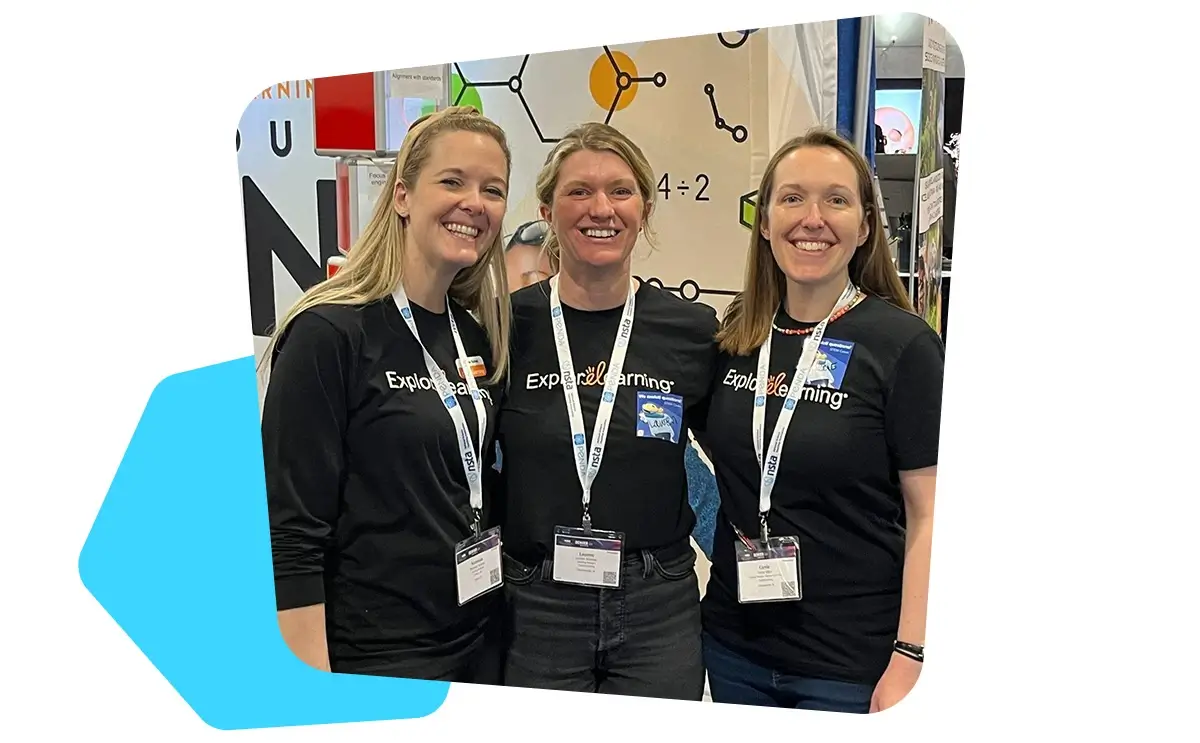
Suzanne Kehret, Lauren Schetne, and Carrie Adler share their experiences from NSELA and NSTA.
Presenting NSELA: Integrating SEPs and HQIM into classroom instruction
The trip started with Suzanne’s presentation at the NSELA conference. It was not only a professional highlight but also a fantastic opportunity for networking and collaboration. Engaging with fellow science education leaders from diverse backgrounds and experiences provided us with invaluable insights and perspectives.
We fostered lively discussions during our session and exchanged ideas on integrating Science and Engineering Practices (SEPs) and High-Quality Instructional Materials (HQIM) into classroom instruction. As we explored educators' challenges in assessing student learning, we also shared innovative strategies and best practices for overcoming these obstacles.
Beyond our presentation, networking with other science leaders offered a wealth of knowledge and inspiration. From informal conversations during coffee breaks to more structured networking events, these interactions sparked new ideas, challenged thinking, and reinforced the importance of collaboration in driving meaningful change in the field of science education. By leveraging our collective expertise and resources, we can work together to empower educators and inspire students to become lifelong learners and critical thinkers in the world of science.
In addition to our presentation and networking endeavors, we also took the opportunity to pilot a new way of collecting educator feedback: pom-pom voting boxes designed to gather insights into priorities in STEM education. These colorful and interactive voting boxes provided a novel way for conference attendees to express their opinions on key issues and initiatives shaping the future of science education.
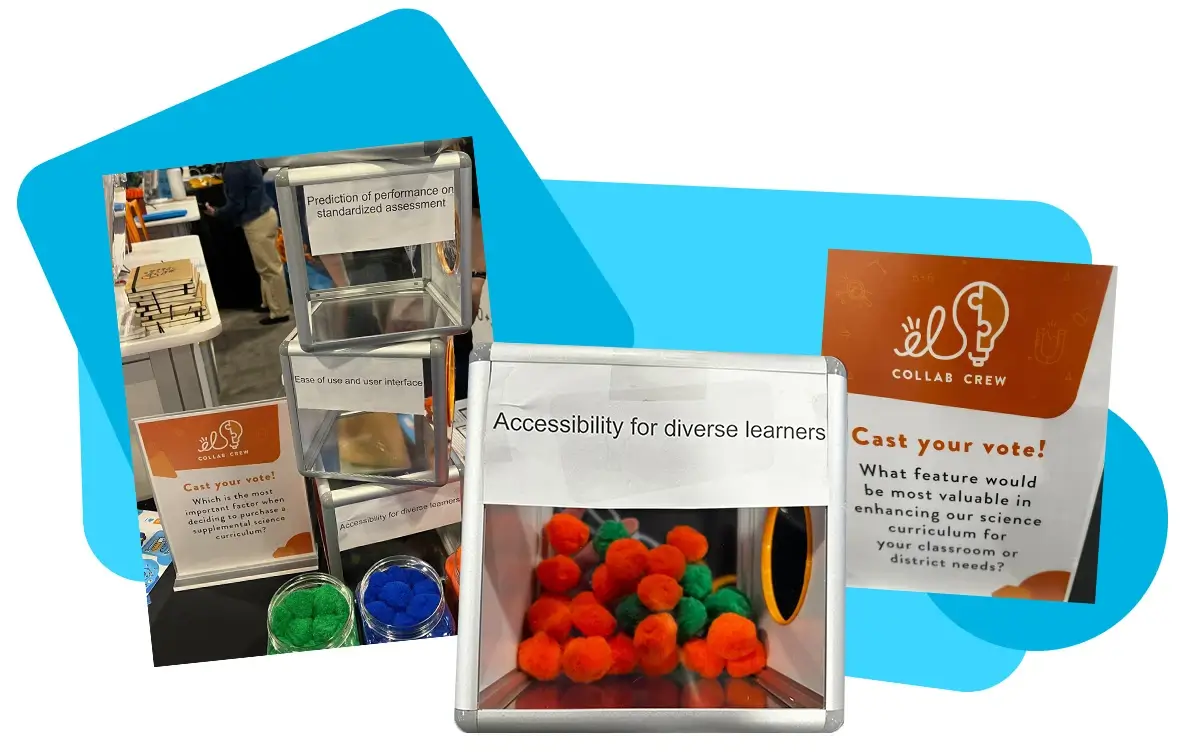
After NSELA, we took the boxes to NSTA, where educators enthusiastically engaged with the voting boxes, casting their votes on topics ranging from curriculum development to technology integration. The data collected from these voting sessions will serve as valuable feedback, guiding our future initiatives and resource allocation efforts aimed at addressing the evolving needs of STEM educators and students.
Visitors to the ExploreLearning Collab Crew booth voted on the most critical components they look for in supplemental science curriculum materials. The big takeaways from our survey with teachers, administrators, and science curriculum developers pointed to the following priorities:
- Accessibility for diverse learners
- Focus on Science and Engineering Practices
- Ease of use and user interface
What else? Rarely did anyone vote for the need to “predict student performance on standardized assessments”! And administrators expressed their desire to support and empower teachers in whatever ways that teachers need.
Unlocking learning adventures: Presenting Gizmos STEM cases
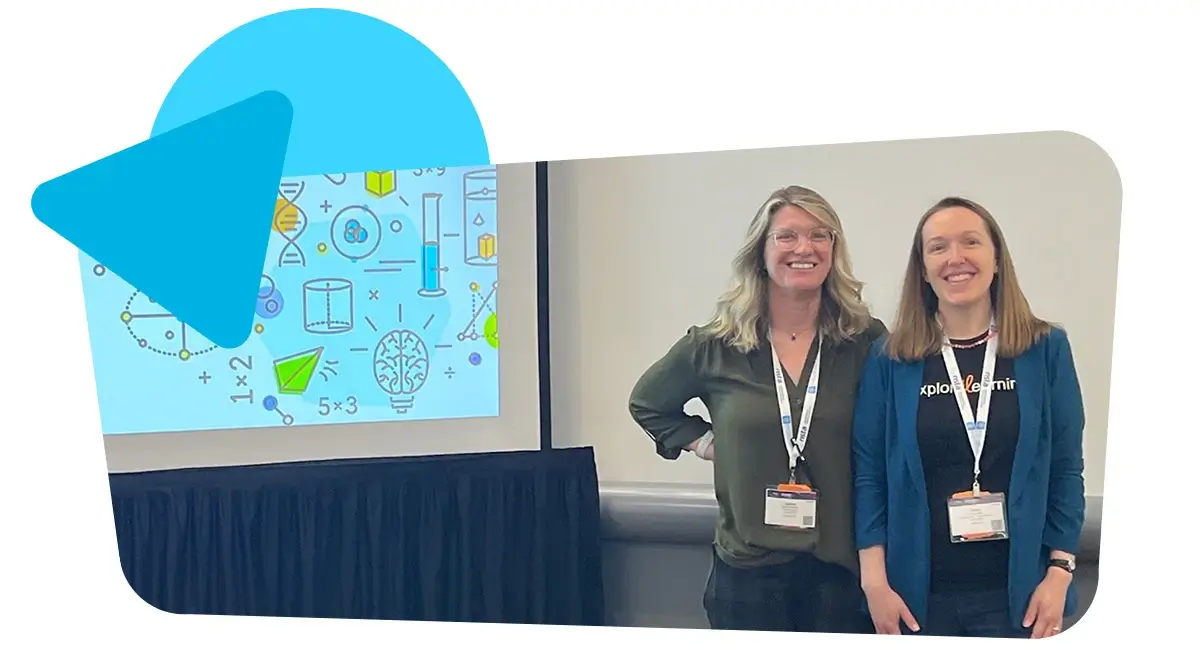
Schetne and Adler shared how to use Gizmos STEM Cases for real-world applications.
Lauren and Carrie’s presentation highlighted key features of Gizmos STEM Cases. This presentation focused on demonstrating how STEM Cases:
Create Project-Based Learning environments that put students in real-life scenarios and careers. When students actively engage in real-world and personally meaningful projects, they improve their academic performance, learn and develop long-term retention skills, build communication and collaboration skills, and engage more deeply with a topic.
Follow 3-D learning practices and align to Next Generation Science Standards (NGSS) standards. Specifically, we focus on developing STEM Cases that help teachers with the following Science and Engineering Practices (SEPs):
- Analyzing and interpreting data
- Using mathematics and computational thinking
- Constructing explanations and designing solutions
- Engaging in argumentation from evidence
Use modeling for sensemaking. In Gizmos STEM Cases, students use models to:
- Investigate, predict, and explain “what happens” in phenomena
- Communicate ideas and designs to others
- Test, compare, and improve the effectiveness of design solutions
Gizmos STEM Case modeling practices help students build their skills in:
- Constructing, revising, and testing a design solution
- Visualizing small-scale and large-scale relationships
- Analyzing data
- Using data to refine a solution
- Using data in scientific argumentation
Insights and innovations straight from classrooms
Getting on-the-ground feedback on what works or doesn’t work in real-world classrooms only makes our products better. We brought along a new addition to Gizmos swag: Axl the Axolotl stickers (designed by STEM Case Art Director Hilary Pierce). Axl is the Pokemon-inspired mascot in new STEM Cases who provides student feedback.
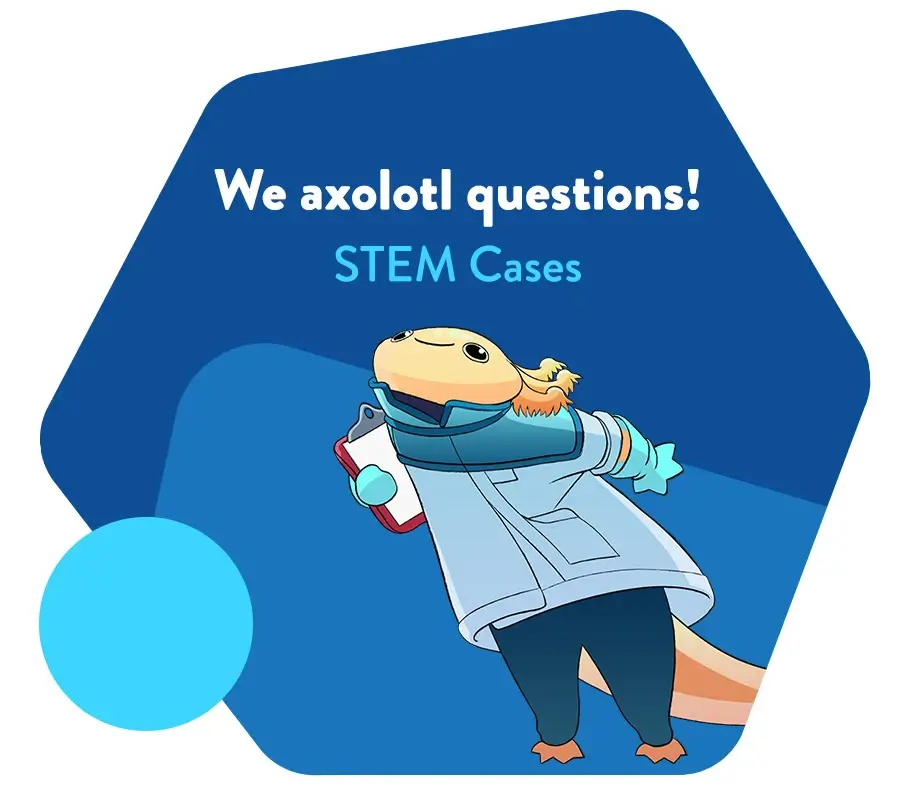
Teachers requested more Gizmos STEM Cases for middle school students. Good news! Lauren and Carrie are working on several new STEM Cases aligned with the Next Generation Science Standards for middle school. Topics include:
- Taking on the role of an earth scientist to investigate earthquakes and develop an early warning system.
- Solving a river ecosystem mystery to reduce erosion and bring American Shad back to the James River in Virginia.
- Designing a helmet that better protects athletes against concussions.
Looking Ahead: Shaping the future of STEM learning
As Learning Designers, we were SO excited to see how many teachers used and loved our products, and also enthusiasm about providing feedback both during the development phases of new Gizmos and STEM Cases as well as user feedback from the classroom for released products.
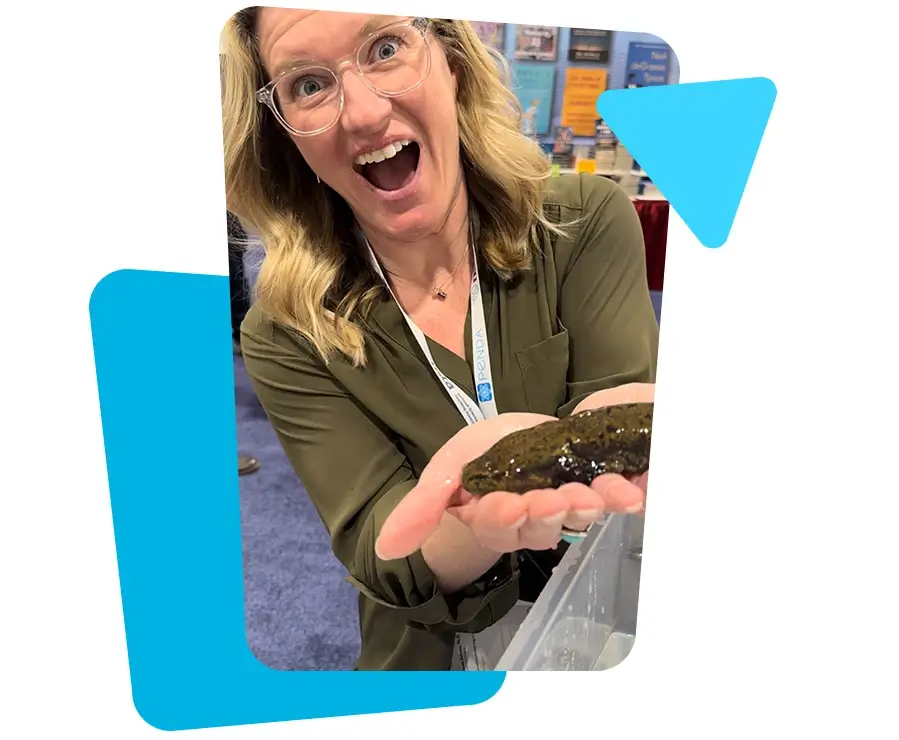
Lauren met a real-life Axl! Here she poses with a new axolotl friend.
We want to feed off that momentum! We are always interested in partnering with teachers through our Tech Testers group who want to brainstorm new ideas for STEM Cases they’d like to see developed in the future. Would you like to provide feedback on lessons and STEM Cases currently in production and run user-testing with students in your classroom on existing STEM Cases to provide feedback on content, user experience, accessibility, assessment practices, and more? Complete the Tech Tester survey and share your interest in either production feedback or user-testing feedback, details about your expertise, and the STEM Cases you’d like to test.
Are you wondering about the details? While Tech Testers aren’t paid, you get to participate in the development of national-scale learning materials–a resume booster, for sure! We also value your time, so you can set your own limits about what works for you.
Final reflections from the NSELA and NSTA conferences
In conclusion, the NSELA and NSTA conferences in Denver were an enriching experience for our team at ExploreLearning. From presenting sessions to piloting our innovative pom-pom voting boxes, we immersed ourselves in conversations and collaborations to advance science education. Networking with fellow science leaders provided valuable insights and perspectives, reinforcing the importance of collaboration in driving meaningful change in the field.
The feedback from educators through our voting boxes will guide our future initiatives and resource allocation efforts, ensuring that we continue to meet the evolving needs of STEM educators and students. Our presentation on Gizmos STEM Cases also highlighted the key features and benefits of our project-based learning environments, aligned with NGSS standards and focused on Science and Engineering Practices.
Moving forward, we are excited to further engage with educators through initiatives like our Tech Testers group, where teachers can provide feedback on new developments and participate in user testing. By partnering with teachers, we can continue to innovate and improve our products, ultimately empowering educators and inspiring students to become lifelong learners and critical thinkers in the world of science.
